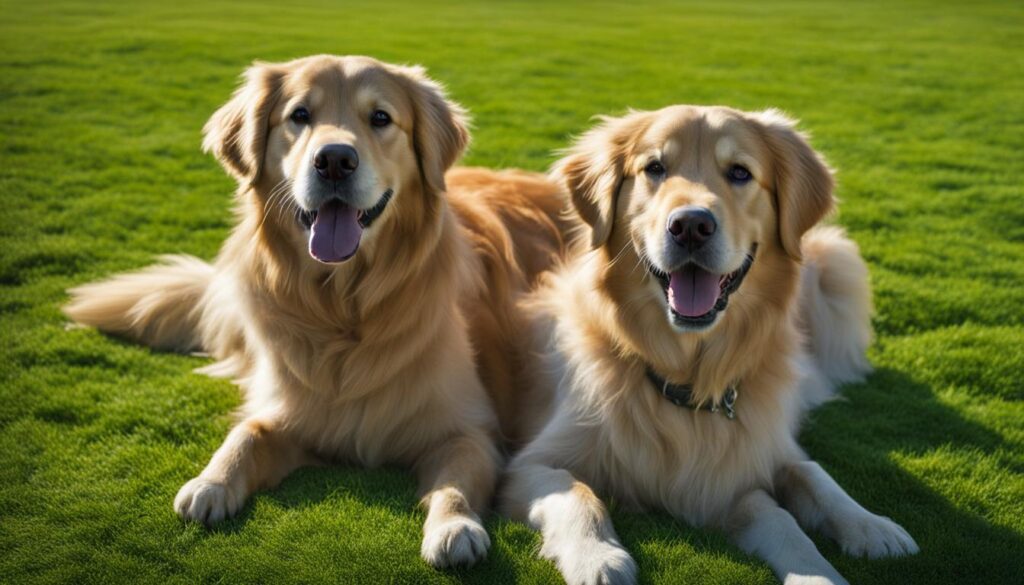If you've ever wondered why does my dog keep yawning and stretching, you're not alone. These behaviors are quite common in dogs and can have various meanings. Understanding why dogs yawn and stretch can help you better communicate with your furry friend and ensure their well-being. In this article, we'll explore the reasons behind these behaviors and what they might indicate about your dog's health, communication, tiredness, stress, and anxiety.
Key Takeaways:
- Yawning in dogs can serve as a form of communication, a calming signal, or a way to cool down the brain.
- Yawning can indicate various emotions and states, including tiredness, stress, anticipation, love and affection, and indifference.
- Excessive yawning in dogs may be a sign of anxiety and should be addressed.
- Understanding a dog's body language and context is crucial in interpreting the meaning behind their yawns.
- If your dog is yawning excessively, it's important to determine the underlying cause and seek appropriate help if needed.
The Meaning of Dog Is Yawning: Communication and Body Language
When a dog yawns, it can be more than just a simple reflex. Yawning in dogs often serves as a form of communication and body language, conveying important messages to fellow canines and humans alike. Although yawning can have various meanings, it is frequently used as a calming signal, a gesture that indicates peaceful intentions and helps to diffuse tense situations.
Dogs may yawn to communicate their desire for a peaceful interaction with another dog. By yawning, they signal that they come in peace and wish to avoid any confrontation. This behavior can be observed during encounters or introductions between unfamiliar dogs, where one dog may offer a yawn as a way of saying, “I'm not a threat, let's keep things calm and friendly.”
“Yawning in dogs often serves as a calming signal, conveying peaceful intentions and helping to diffuse tense situations.”
In addition to signaling peace, dogs also use yawning as a way to calm themselves down when feeling stressed or anxious. Yawning helps to release tension and regulate emotions, allowing dogs to cope with challenging situations. By yawning, they can self-soothe and regain a sense of calmness, helping them navigate through stressful moments.
It's important to note that while yawning can be a meaningful signal, it should always be considered alongside other body language cues to accurately interpret a dog's message. Tail position, ear movement, facial expression, and overall body posture can provide valuable context in understanding the true meaning behind a dog's yawn. By paying close attention to these body language signals, we can better comprehend our canine companions and respond appropriately to their needs.
Why Does My Dog Keep Yawning and Stretching: Key Body Language Signals
When deciphering a dog's body language, it's crucial to look for these key signals that often accompany yawning:
- Tail held low or tucked between the hind legs
- Whale eye (when the white portion of the eye is visible)
- Lip licking or tongue flicking
- Turning or averting the head
- Freezing or stiffening of the body
- Backing away or trying to create distance
These signals can indicate stress, anxiety, or discomfort, and should be addressed with care and sensitivity. If you observe these signs in your dog along with excessive yawning, it may be a good idea to consult with a professional trainer or behaviorist who can provide guidance on how to support your dog's emotional well-being.
| Body Language Signal | Meaning |
|---|---|
| Tail held low or tucked between the hind legs | Submission or fear |
| Whale eye | Anxiety or discomfort |
| Lip licking or tongue flicking | Stress or nervousness |
| Turning or averting the head | Avoidance or disinterest |
| Freezing or stiffening of the body | Tension or aggression |
| Backing away or trying to create distance | Desire for space or avoidance |
Common Reasons for Dog Yawning a Lot


Yawning is a natural behavior in dogs that can have various meanings. Understanding the common reasons behind dog yawning can help dog owners better interpret their furry friend's communication and overall well-being.
Frustration: Dogs may yawn when they feel frustrated or when they've reached their threshold for tolerance. It can be their way of signaling that they've had enough and are feeling overwhelmed.
Stress: Similar to humans, dogs can exhibit yawning as a response to stress or anxiety-inducing situations. Thunderstorms, visits to the vet, or unfamiliar environments can trigger stress in dogs, leading to increased yawning.
Anticipation: Dogs may yawn in anticipation of something exciting or enjoyable. For example, if a dog knows it's time for a walk or playtime, they may yawn as a way to express their excitement and readiness.
Tiredness: Yawning is commonly associated with tiredness in both humans and dogs. If your dog has had a busy day or is feeling sleepy, they may yawn as a natural way to signal their need for rest.
Love and Affection: Yawning can also be a display of love and affection from a dog towards their human companion. It can be a reciprocal response to a human yawn, reflecting the bond and emotional connection between them.
Contagious Yawning: Dogs, like humans, can exhibit contagious yawning. When a dog sees another dog or human yawning, it can trigger a yawn response in them as well. This phenomenon reflects empathy and social bonding between dogs and their human counterparts.
| Reasons for Dog Yawning | Description |
|---|---|
| Frustration | Yawning can signal that a dog has reached their tolerance threshold and is feeling frustrated or overwhelmed. |
| Stress | Yawning can be a response to stress or anxiety-inducing situations, such as thunderstorms or visits to the vet. |
| Anticipation | Dogs may yawn in anticipation of something exciting or enjoyable, like going for a walk or playing. |
| Tiredness | Yawning is commonly associated with tiredness and can indicate a dog's need for rest. |
| Love and affection | Yawning can be a display of love and affection from a dog towards their human companion. |
| Contagious Yawning | Dogs can exhibit contagious yawning when they see another dog or human yawning, reflecting empathy and social bonding. |
“Yawning is a natural behavior in dogs that can have various meanings.”
Dog Is Yawning Too Much: Causes and What to Do


Excessive yawning in dogs can be a concerning behavior that may indicate underlying stress or anxiety. Identifying the causes of excessive yawning is crucial in order to address the issue effectively and promote the well-being of your furry friend.
One common cause of excessive yawning in dogs is anxiety. Dogs can experience anxiety in various situations, such as during thunderstorms or when facing separation from their owners. This anxiety can manifest as excessive yawning, along with other stress-related behaviors. It's important to manage anxiety in dogs by creating a safe and calm environment, identifying triggers, and implementing techniques that help alleviate stress.
Separation anxiety is another potential cause of excessive yawning in dogs. When dogs feel anxious or distressed due to being separated from their owners, they may yawn excessively as a way to cope with their emotions. Managing separation anxiety involves gradually desensitizing dogs to being alone, providing comfort through interactive toys or calming aids, and seeking guidance from a professional if necessary.
If you notice your dog exhibiting excessive yawning, it's important to observe their overall behavior and look for other signs of stress or anxiety. These may include trembling, panting, pacing, or destructive behavior. Consulting with a veterinarian or professional trainer can provide valuable insight and guidance on how to manage your dog's stress and promote their well-being.
| Causes of Excessive Yawning in Dogs | What to Do |
|---|---|
| Anxiety in various situations (e.g., thunderstorms, separation) | – Create a safe and calm environment – Identify triggers and manage anxiety-inducing situations – Implement techniques to alleviate stress |
| Separation anxiety | – Gradually desensitize dogs to being alone – Provide comfort through interactive toys or calming aids – Seek guidance from a professional if needed |
Anxiety Yawning and Dog Stress Management
Excessive yawning in dogs can often be attributed to anxiety and stress. By addressing the underlying causes and implementing effective stress management techniques, you can help your dog feel more relaxed and content. It's important to create a safe and calm environment for your dog, provide outlets for physical and mental stimulation, and consider alternative therapies such as aromatherapy or music therapy. Additionally, seeking guidance from a professional trainer or behaviorist can provide valuable strategies tailored to your dog's specific needs. Remember, promoting your dog's mental well-being is just as important as their physical health.
Healthy Dog Yawning and Stretching: The Body's Natural Response


Yawning and stretching are common behaviors in dogs that serve as the body's natural response to various situations. These actions can indicate tiredness, a transition in the state of arousal, or a change in mood. Yawning often occurs when a dog is transitioning from sleep to wakefulness, reflecting their need for rest or their readiness to engage in activities.
Contagious yawning is a fascinating phenomenon observed in both dogs and humans. It reflects empathy and emotional connection, with dogs often yawning in response to seeing their human or fellow canines yawn. This contagious yawning is a manifestation of the bond and social cohesion between dogs and their owners.
Yawning can also be a form of communication. Dogs may yawn to signal their indifference and calmness towards other dogs or humans, highlighting their peaceful intentions. However, interpreting a dog's yawning should be done in conjunction with other body language signals to gain a comprehensive understanding of their message.
In some cases, yawning can indicate stress or anxiety in dogs. When accompanied by other signs of stress, such as panting, pacing, or whining, excessive yawning may be a signal that the dog is feeling overwhelmed or anxious. It's important to pay attention to these signs and address the underlying causes to promote the well-being of the dog.
| Signs of Stress | Examples |
|---|---|
| Panting | Heavy and rapid breathing |
| Pacing | Restlessly walking back and forth |
| Whining | High-pitched vocalization |
Understanding the natural response of dogs to yawning and stretching can provide insights into their communication and promote their overall well-being. By paying attention to the context, body language cues, and any accompanying signs of stress, dog owners can better respond to their furry companions' needs and ensure a healthy and happy lifestyle.
Conclusion – Yawning In Dogs
Yawning and stretching are common behaviors in dogs that can have various meanings. Understanding the reasons behind dog yawning can help interpret their communication and promote their well-being. Yawning can indicate tiredness, stress, anticipation, love and affection, or serve as a calming signal.
Excessive yawning should be addressed, as it may be a sign of anxiety. By observing a dog's body language and considering the context, owners can better understand and respond to their dog's needs.
Yawning is a natural reflex for dogs and can serve as a way for them to communicate their emotions and physical state. Whether it's a sign of tiredness after a long day of play, a way to release stress and anxiety, or a gesture of love and affection, yawning has important implications in a dog's well-being. It's crucial for dog owners to pay attention to their pets' yawning behavior and take appropriate measures to ensure their comfort and happiness.
Remember to observe your dog's overall body language and consider the context before drawing conclusions solely based on yawning. By being attuned to their communication signals, owners can deepen their bond with their dogs and provide the best care possible.
FAQ
Why does my dog yawn?
Dogs yawn for various reasons, including communication, stress, anticipation, love and affection, and tiredness.
What does excessive yawning in dogs mean?
If you notice your dog yawning frequently, it could be a sign of stress or anxiety. Yawning can also be a way for dogs to communicate discomfort or to calm themselves down. If you have seen your dog yawning excessively, it's important to look for any other signs of aggression or distress. It is also found that dogs may yawn to show submission or to signal that they are not a threat to other dogs.
What does it mean when a dog stretches and yawns a lot?
When a dog stretches and yawns a lot, it usually indicates that they are feeling relaxed and comfortable. Dogs also yawn to release tension and communicate a non-threatening and calm demeanor. However, excessive yawning and stretching can also be a sign of anxiety or discomfort, so it's important to observe the dog's body language and behavior to understand the reason behind their actions. Overall, frequent stretches and yawns are a natural and common behavior for dogs and should not be a cause for concern unless accompanied by other signs of aggression or distress.
Why is my dog yawning and swallowing so much?
If you notice your dog yawning and swallowing frequently, it could be a sign that they are feeling stressed or anxious. Dogs often yawn when they're trying to alleviate tension or calm themselves down. They may also lick their lips and start yawning when they're feeling uneasy.
Another type of yawn is when a dog is tired, similar to how humans yawn when they are sleepy. It's important to pay attention to your dog's body language and the context in which they are yawning. While frequent yawning can be a sign of stress or discomfort, occasional yawning is perfectly normal. If you notice your dog yawning due to stress, try to identify and address the source of their anxiety.
What does anxiety look like in dogs?
Anxiety in dogs can manifest in various ways, one of which is yawning out of stress. When a dog is feeling anxious or uncomfortable, they might start yawning excessively. This can be a sign that the dog is trying to calm itself down in a stressful situation.
Some theories behind why dogs yawn include that it helps regulate their body temperature or that it increases alertness. However, it is important to note that yawning is perfectly normal for dogs, and they may also yawn when they see someone else yawning. If you notice your dog is yawning frequently in certain situations, it may be a sign that they are feeling anxious.
Is yawning a form of communication for dogs?
Yes, dogs may yawn to communicate peaceful intentions towards other dogs or as a way to calm themselves down when feeling stressed.
What are some common reasons for dog yawning?
Dogs may yawn out of frustration, stress, anticipation, tiredness, and to display love and affection. Yawning can also be contagious among dogs and humans.
When should excessive yawning in dogs be a cause for concern?
Excessive yawning can be a sign of underlying stress or anxiety in dogs and should be addressed. It's important to identify the cause and take appropriate measures to help your dog feel better.
Why do dogs yawn and stretch?
Yawning and stretching in dogs can indicate tiredness, a transition in the state of arousal, changing moods, and can also be a natural response to various situations.





